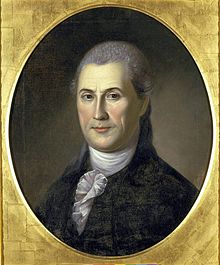Samuel Huntington was born in Windham, Connecticut on July 2, 1732. His family were farmers in Windham. His ancestors were respectable; they came to America at an early period of the country and settled in Connecticut.
Samuel Huntington did not receive a public education. He was the eldest son, and his father needed his help on the farm. However, Huntington had a strong desire to learn. So after work each day, he read many books. He possessed an extinsive range of knowledge in many fields. By age 21, his self-education was comparable to a college education. His knowledge, however, was less scientific but more practical and useful.
Samuel Huntington: Profession
Although not opposed to farming, he had a fondness for law. At the age of twenty-two, he left the farm for the study of the law. However, he did not have the means to afford tuition for law school. An attorney in a neighboring town loaned Huntington law books. His diligence and perseverance did the rest.
Huntington soon obtained a competent knowledge of the principles of law to begin the practice of law. He opened an office in his native town, but in 1760, he moved to Norwich, where there was more opportunity. He soon became eminent as a man of great integrity and punctuality.
In 1764, Mr. Huntington represented the town of Norwich in the general assembly. The following year, he was appointed to the office of king’s attorney. In 1774, he became an associate judge in the superior court, and soon after an assistant in the council of Connecticut.
Samuel Huntington: Patriot
Huntington opposed the British parliament’s abuse of colonial taxation. In October 1775, the general assembly appointed him to represent them in the Continental Congress. On July 4, 1776, Samuel Huntington voted in favor of the Declaration of Independence.
In 1779, the Continental Congress appoint Huntington as president of the congress. He continued to serve until his health deteriorated in 1781. Upon his retirement, Huntington received the public gratitude of the Congress.
Samuel Huntington: Public Servant
Soon after his return to his native state, Connecticut appointed him as Chief Justice of the Superior Court. In 1785, the state elected him as lieutenant governor. The next year the state elected him as governor. He continued to serve as governor until his death on January 5, 1796.
Samuel Huntington: Piety
Samuel Huntington was a devoted Christian. He attended church every Sunday. Occasionally, he led worship services and provided spiritual instruction.
Conclusion
Samuel Huntington did not have the advantage of wealth or a liberal education. Instead, he had genius, courage, and perseverance. With these gifts, he achieved public respect and served his country.
